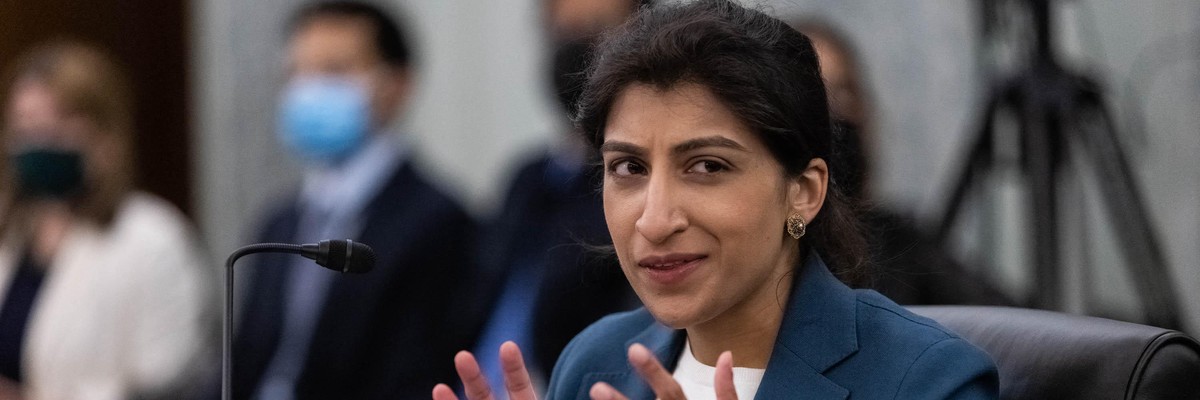In a Wednesday letter to the CEOs of Amazon and Facebook, four congressional Democrats called on the tech giants to stop trying to "strip Federal Trade Commission (FTC) Chair Lina Khan of her authority to enforce antitrust law."
"The real basis of your concerns appears to be that you fear Chair Khan's expertise and interpretation of federal antitrust law."
--Democrats' letter
President Joe Biden appointed the 32-year-old "antitrust trailblazer" to lead the FTC after she was confirmed by a bipartisan Senate vote in June. Amazon and Facebook responded by pressuring Khan to recuse herself from antitrust matters involving the companies--provoking the new letter from Sens. Elizabeth Warren (D-Mass.), Richard Blumenthal (D-Conn.), and Cory Booker (D-N.J.), along with Rep. Pramila Jayapal (D-Wash.).
The lawmakers warn (pdf) Amazon's Andy Jassy and Facebook's Mark Zuckerberg that "your efforts only add to the perception that you are attempting to bully your regulators, disarm the FTC, and avoid accountability rather than to strengthen ethics standards, and you should cease these efforts immediately."
Progressive advocates have cheered the rise of the former Columbia Law School associate professor, and praised Biden and senators for empowering someone with her background.
"Lina Khan has proven herself as one of the fiercest and most effective critics of Big Tech," Demand Progress executive director David Segal said after her Senate confirmation. "She not only understands the threat these monopolies impose, but how to utilize the tools of government to hold them accountable and break them up."
In their letter to Big Tech CEOs, the lawmakers write that "both of your companies have engaged in a coordinated attack to discredit Chair Khan on ethics grounds, even--in the case of Amazon--going so far as to request immunity from any future antitrust investigations."
"The real basis of your concerns appears to be that you fear Chair Khan's expertise and interpretation of federal antitrust law," they continue. "To argue that federal ethics laws preclude Chair Khan from exercising her expertise is illogical and inconsistent with the plain language of the relevant statutes and with FTC ethics officials' interpretations of recusal requirements."
"There is no basis for her recusal under the current federal ethics statute or FTC precedent," the letter states. "Your efforts to sideline Chair Khan appear to be nothing more than attempts to force an FTC stalemate that would allow you to evade accountability for any anti-competitive behavior."
The letter adds that "if you are serious about ending conflicts of interest in Washington, you can show your sincerity by supporting legislation that makes federal ethics rules and enforcement even more stringent."
In December, Warren and Jayapal reintroduced the Anti-Corruption & Public Integrity Act, explaining at the time that their proposal "is more urgent than ever in order to rein in corruption, strengthen ethics, end lobbying as we know it, improve the integrity of our judiciary, reform campaign finance laws, and finally ensure that we put people over profits and communities over corporations."
Along with calling out Amazon and Facebook's attacks on Khan, the four lawmakers sent the companies a list of questions "in order to ensure that your own respective legal and governmental efforts are meeting appropriate ethics standards and are free of conflicts of interest," requesting responses by August 18.
The battle over Khan's power in her new role comes as lawmakers, federal regulators, and advocacy groups have continued to not only raise antitrust concerns about Amazon and Facebook but also express various other critiques of both companies' business practices.

